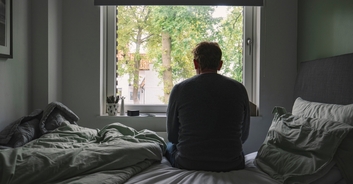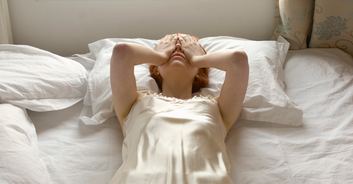While all first-borns are aware that they are smarter than their siblings - well, at least according to a recent study published by The Journal of Human Resources - it now appears that they have one more thing to lord over their younger siblings' heads.
New research claims that second-born children are more likely to misbehave than their older counterparts, and it can even result in severe disciplinary action.

A report from MIT appears to corroborate the "curse of the second born child", after alleging that second-born kids are much more likely to be rebellious.
Researchers collected data from thousands of sets of siblings, and the results showed that second-born babies are 25 to 40 per cent more likely to get into serious trouble at school, or even with the law - meaning potential jail time.
"Despite large differences in environments across the two areas, we find remarkably consistent results: In families with two or more children, second-born boys are on the order of 20 to 40 percent more likely to be disciplined in school and enter the criminal justice system compared to first-born boys even when we compare siblings," the authors of the study wrote in an ensuing paper.
The study claims that this all boils down to our parents, and how they alter their parenting style from child to child. Things like the first born getting undivided attention, and making the second-born fight for one-to-one time is a significant factor.

According to NPR: "The firstborn has role models, who are adults. And the second, later-born children have role models who are slightly irrational 2-year-olds, you know, their older siblings. Both the parental investments are different, and the sibling influences probably contribute to these differences we see in the labor market and what we find in delinquency. It's just very difficult to separate those two things because they happen at the same time."
As such, a combination of receiving a lack of attention from their parents, and a rivalry with the oldest sibling can result in the second-born child having an unruly attitude. This can, in turn, make them more inclined to get into trouble at school, leading them to even break the law one day.

"In addition to the fact that first-borns experience undivided attention until the arrival of the second-born, we discovered that the arrival of the second-born child has the potential to extend the early-childhood parental investment in the first-born child," the report concluded.
Of course, this doesn't mean that all second-born children will have trouble with authority, and go onto lead a life of crime. It's all dependant on your family setup and your own personal characteristics and goals.
As the authors of the study mention, "Only a minority of kids, maybe, you know, 1 in 10, 1 in 20, are getting in serious trouble," so it's not all doom and gloom if you're the second-born child, after all.


.jpg_klhOkr?tr=h-40&config=JTdCJTIybmFtZSUyMiUzQSUyMm51cnNpbmclMjBob21lJTIwKDEpLmpwZyUyMiUyQyUyMmRlc2NyaXB0aW9uJTIyJTNBJTIyRmVhdHVyZWQlMjBpbWFnZSUyMGNyZWRpdCUzQSUyME1BU1RFUiUyMCUyRiUyMEdldHR5JTIyJTJDJTIyYWx0ZXJuYXRpdmVfdGV4dCUyMiUzQSUyMm51cnNpbmclMjBob21lJTIwKDEpLmpwZyUyMiUyQyUyMmNhcHRpb24lMjIlM0ElMjJGZWF0dXJlZCUyMGltYWdlJTIwY3JlZGl0JTNBJTIwTUFTVEVSJTIwJTJGJTIwR2V0dHklMjIlMkMlMjJjb29yZGluYXRlcyUyMiUzQSU3QiUyMmRlc2t0b3AlMjIlM0ElN0IlMjJsZWZ0JTIyJTNBMCUyQyUyMnRvcCUyMiUzQTAlMkMlMjJyaWdodCUyMiUzQTElMkMlMjJib3R0b20lMjIlM0EwLjUyJTdEJTJDJTIydGFibGV0JTIyJTNBJTdCJTIybGVmdCUyMiUzQW51bGwlMkMlMjJ0b3AlMjIlM0FudWxsJTJDJTIycmlnaHQlMjIlM0FudWxsJTJDJTIyYm90dG9tJTIyJTNBbnVsbCU3RCUyQyUyMm1vYmlsZSUyMiUzQSU3QiUyMmxlZnQlMjIlM0FudWxsJTJDJTIydG9wJTIyJTNBbnVsbCUyQyUyMnJpZ2h0JTIyJTNBbnVsbCUyQyUyMmJvdHRvbSUyMiUzQW51bGwlN0QlN0QlMkMlMjJ3aWR0aCUyMiUzQTE1MzUlMkMlMjJoZWlnaHQlMjIlM0E4MDAlMkMlMjJ1dWlkJTIyJTNBJTIyOGFkN2ZlYjMtYzNiMC00YzI2LTkzMTgtY2ZmYzBhY2IwNTYxX193cC1jb250ZW50JTJGdXBsb2FkcyUyRm51cnNpbmdob21lKDEpLmpwZ19rbGhPa3IlMjIlN0Q=)





.jpg_klhOkr?tr=h-184&config=JTdCJTIybmFtZSUyMiUzQSUyMm51cnNpbmclMjBob21lJTIwKDEpLmpwZyUyMiUyQyUyMmRlc2NyaXB0aW9uJTIyJTNBJTIyRmVhdHVyZWQlMjBpbWFnZSUyMGNyZWRpdCUzQSUyME1BU1RFUiUyMCUyRiUyMEdldHR5JTIyJTJDJTIyYWx0ZXJuYXRpdmVfdGV4dCUyMiUzQSUyMm51cnNpbmclMjBob21lJTIwKDEpLmpwZyUyMiUyQyUyMmNhcHRpb24lMjIlM0ElMjJGZWF0dXJlZCUyMGltYWdlJTIwY3JlZGl0JTNBJTIwTUFTVEVSJTIwJTJGJTIwR2V0dHklMjIlMkMlMjJjb29yZGluYXRlcyUyMiUzQSU3QiUyMmRlc2t0b3AlMjIlM0ElN0IlMjJsZWZ0JTIyJTNBMCUyQyUyMnRvcCUyMiUzQTAlMkMlMjJyaWdodCUyMiUzQTElMkMlMjJib3R0b20lMjIlM0EwLjUyJTdEJTJDJTIydGFibGV0JTIyJTNBJTdCJTIybGVmdCUyMiUzQW51bGwlMkMlMjJ0b3AlMjIlM0FudWxsJTJDJTIycmlnaHQlMjIlM0FudWxsJTJDJTIyYm90dG9tJTIyJTNBbnVsbCU3RCUyQyUyMm1vYmlsZSUyMiUzQSU3QiUyMmxlZnQlMjIlM0FudWxsJTJDJTIydG9wJTIyJTNBbnVsbCUyQyUyMnJpZ2h0JTIyJTNBbnVsbCUyQyUyMmJvdHRvbSUyMiUzQW51bGwlN0QlN0QlMkMlMjJ3aWR0aCUyMiUzQTE1MzUlMkMlMjJoZWlnaHQlMjIlM0E4MDAlMkMlMjJ1dWlkJTIyJTNBJTIyOGFkN2ZlYjMtYzNiMC00YzI2LTkzMTgtY2ZmYzBhY2IwNTYxX193cC1jb250ZW50JTJGdXBsb2FkcyUyRm51cnNpbmdob21lKDEpLmpwZ19rbGhPa3IlMjIlN0Q=)



